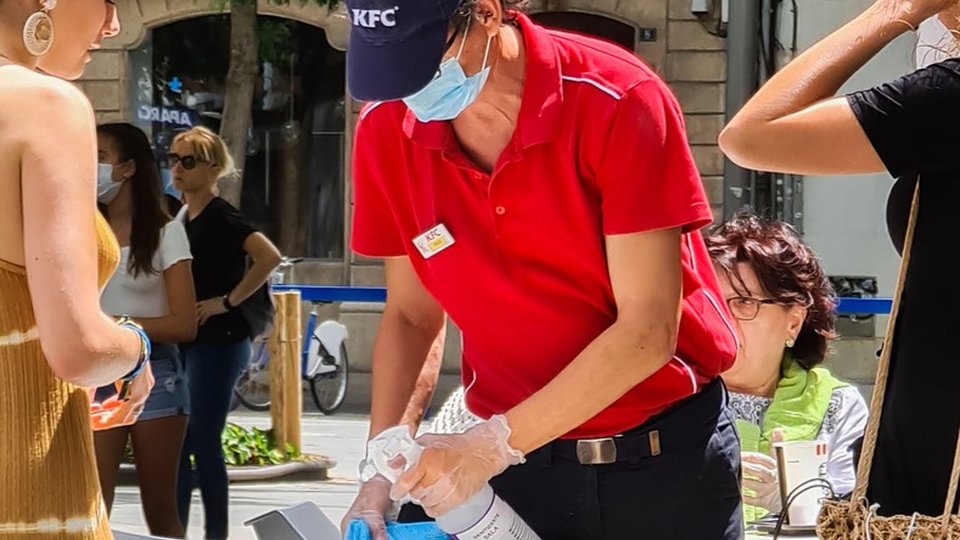Staffing
Easing quick-service staff stress in uncertain times
Amid all the pandemic-induced stress everybody feels, it's easy to overlook to the heightened demands and stress put on QSR workers. Here's why it's important for restaurateurs to stay mindful and active on that subject.

November 17, 2020
By Ian Christopher/ Galley CEO
The exceptional stress already present among restaurant industry leaders and staff has increased exponentially during this challenging year when, for instance, QSR sales declined by 35% in April alone, and more recently, an estimated 60% of restaurants that are currently closed due to coronavirus, won't reopen, according to Yelp.
Despite all of this, the pandemic's effect on QSR workers' mental health is likely not receiving the attention and action it deserves. In fact, food service faces significant challenges around both worker mental health and shortages of those same workers, still needed to execute in an ever-more-difficult environment.
It's no secret, of course, that for years restaurants have had revolving doors of FOH and BOH staff, as previous years' low unemployment rates made recruiting, training and staffing a big challenge. But now, even with the current unemployment rate in the U.S. at 6.9%, barriers to get employees through the door remain high.
Restaurant workers are working longer hours, but often don't necessarily reap the benefits. Pay remains stagnant in many jurisdictions nationally, and often, unemployment checks are more attractive than the prospect of working a minimum (or nearly minimum) wage job that, due to the nature of the work, puts the health of the worker and worker's family at risk.
Restaurateurs need to look at how they can offer employees better quality of life — which is absolutely necessary to ensure a bright future for QSR labor.
Making QSR work-a-day life less stressful
Increased delivery and takeaway orders are here to stay, and traditional dine-in services have dramatically transformed. Restaurateurs can't control the external factors affecting the business, but there are several ways to make operations easier to manage:
- Easily scale recipes with QR codes for the kitchen. An influx of food tech is making BOH training easier than ever. The best food tech platforms are introducing ways for chefs and cooks to asynchronously communicate recipes, ingredients and best practices with a simple barcode scan, allowing brands to have more confidence in their BOH staff's cooking, while those staff members become more confident in what they cook. QR codes have also become popular in the FOH, where customers can scan them for menus and ingredients.
- Abbreviate menus to ease customer customization. Customers have become accustomed to meal options including gluten-free, dairy-free vegan, vegetarian, keto and more. However, all those options can mean longer customer order times and still more recipes for kitchen staff to learn, cook and serve. At Galley, we've seen a lot of QSRs pivot to shorter menus that might offer less variety, but give customers more targeted, higher quality options to choose from.
- Evaluate menu items to tighten-up recipe costs.COVID has rocked the food supply chain, causing dairy and meat costs to skyrocket. Modifying the menu can also allow for lower margins. With greater analysis on what menu items are performing the best and worst, it's easier to discern what dishes are worth keeping. Eliminating high-price ingredients and substituting lower-cost recipes is crucial during this time to save money.
The transition to easier operations is closer than you think
We've seen firsthand how restaurant operators are pivoting their business models basically overnight to ensure a less stressful work environment. For example, NYC-based, Junzi Kitchen, eliminated several menu items to decrease labor and food costs when the city first banned dine-in orders earlier this year. Junzi Kitchen removed high-cost ingredients such as beef and eggs and began offering family-sized food bundles to appeal to a wider market with the ingredients they had on hand.
Austin-based, Confituras, created Confituras Little Kitchen. The traditional bakery transitioned their menu to a curbside market where customers can pick up pantry staples like cheese, biscuits, jams, chocolate and even ready-to-use sourdough starters. Curbside operations not only put many menu item hand-offs in well-ventilated areas, but further worker and customer safety, as well.
From stressed to serene: This too shall pass
During COVID, hiring staff, inventory purchasing, and quality control are harder than ever to maintain.
QSR operators and their employees are hit with stressful situations on what feels like a daily basis, from mental health concerns to a labor shortage that sees unemployed workers sometimes making more than those who are on the job.
However, there is light at the end of the tunnel. While QR codes, shorter menus and easier recipes won't solve all QSR stressors, they'll alleviate many operational pain points operators and their teams face throughout the day.









